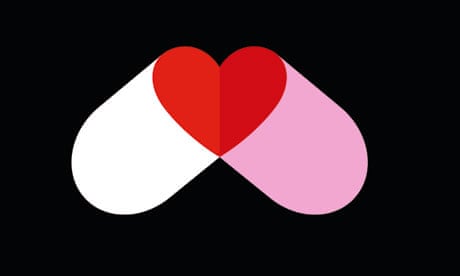We were newly engaged and lying on Curl Curl beach on the coast of New South Wales, Australia, when we experienced one of those rare moments of lucidity. "I hope we do stay together for ever," I said to my fiancee, Farrah. "But, you know, we might not."
I looked at the sky.
"I know," Farrah said. "What do you think the chance is? Fifty-fifty?"
"Maybe," I said. "Seventy-thirty?"
Another silence.
"Maybe."
Eight months later, in Marylebone register office, we made a 100% promise. We did it confidently, legally and in the witness of many. But every now and again, we'll have the conversation once more. "…I hope so…"; "…so do I…"; "…I don't know…"
I've read the brutal figures – nearly half of all UK marriages end in divorce – and every serious relationship I've had, prior to this one, has failed. We've both had broken hearts (Farrah, once; me, too many times to admit). Most of all, we're realists. We may be newly married, but we've been together for nine years, cohabiting for eight. It's long enough to have pushed through periods of domestic hostility and to know what happens to all that sex. It's long enough for us to understand that, as solemn as our oath might have appeared, "Till death do us part" is the sound not of guarantee, but of hope. As happy as we might be today, in 10 years – five years, three! – our relationship could end because… well, that's just what happens, isn't it?
Then, a couple of months ago, I heard some hopeful news. Scientists at the University of Oxford had published a paper that described an incredible idea. At some point in the life of my marriage, it suggested, a new breed of "love drug" might become available – a medication that could heal wounded relationships. It will likely be delivered as an inhaler and prescribed by a relationship counsellor. You'd sniff up a dose in the presence of your loved one and, as the chemical entered your bloodstream, it would strengthen your bond.
I find the men responsible in a nondescript office block behind a branch of LA Fitness. Dr Anders Sandberg welcomes me into his room: Suite 8 of the University of Oxford's Future of Humanity Institute. He has blond hair, a rain-grey shirt and a medallion around his neck engraved with instructions for the cryonic preservation of his body in the event of his death. Across two whiteboards behind him is a map of calculations.
"That's about escaping dust while travelling in a spaceship." He gestures at it dismissively. The remit of Sandberg and his colleagues is, he says, "to think really big and really long term, especially about the fate of humanity. How can we make sure that we don't have an unhappy ending?"
Sandberg became interested in the future of love after his colleague, Professor Julian Savulescu, who leads the science and ethics division, became divorced from his first wife in 2005. "I saw how difficult relationships are, how they change and how powerless you are," Savulescu says, as he joins us. "The experience made me think, how can intelligent people, very confident people, end up in these situations? I said to Anders, 'Let's see what science and psychology have to tell us about love and relationship break-up.'"
Both men were shocked by how little good science there was. "It's quite telling," Sandberg says. "There's a monthly journal about coughing, there are three or four about sleeping, but none about love."
"This is one of the most important areas of our life," Savulescu adds, "and the amount of usable information science had was infinitesimally small." But, as little as it was, it wasn't nothing. A key insight was that love has three distinct modes or phases: attraction, lust and attachment. "The first one, the attraction phase, we don't know much about," Sandberg says.
Leaning towards him, Savulescu whispers, "No, Anders, the first one's lust."
Sandberg smiles. "Well, maybe I'm a romantic. But, anyway, humans are messy: the attraction, lust and attachment phases get blended together."
Every loving relationship, then, can be seen as a unique combination of these three modes. In their paper, the pair describe them as "evolutionary systems [that] form a ground on top of which the cultural and individual variants of love are built". This is the simple but rather melancholy observation that, when you knock away thousands of years of ritual, poetry, myth and song, love is just another neurobiological process, like sweating. But there's an upside. If love is reducible to physical systems, then these systems can, theoretically, be manipulated. Strengthened. For Savulescu, this was an emboldening possibility. "In my previous relationships, I'd been a passive passenger of the emotions," he says. "And I realised, you can be an active participant."
They had to decide: on which of the three modes would they focus their futuristic thinking? A drug that boosted lust, Sandberg says, would not have been terribly interesting, while something that made you fall in love with the next person who walked through the door would, he admits, "be, ethically, a very stupid thing". They would examine the possibility, then, of strengthening attachment, the long-term bonding that keeps people together.
Long-term relationships are problematic for modern humans, they argue, because we aren't built for them. We've evolved to successfully procreate, not to enjoy deathless romance. During our long Pleistocene hunter-gatherer existence, life expectancy is thought to have been about 30 years. This means that, assuming we coupled off as teenagers, for the great majority of our species' history, at least half of all relationships would have ended within 15 years.
Of course, humanity has undergone spectacular developments since it roamed the African savannah. But evolution works slowly. Today we are, they argue, ancient apes living ultra-modern lives. The median length of a marriage is about 11 years which, they point out, fits "surprisingly well" with the Pleistocene 15. As we're living ever longer, we're outlasting the possibilities of love. "Once a couple gets together, they're on borrowed time," Savulescu says. "Our biology wasn't constructed to keep people together for that long. I think we should use our knowledge to give love a helping hand."
Although many relationships end for good reasons, Sandberg says, for some "it might be that the systems underpinning the pair's bond are giving up for completely biological reasons. Nothing to do with you or your partner." So we can fall out of love for physical reasons? "Yes, that's what we're suspecting, although I don't think we're ever going to be able to prove that one particular divorce was biological and another wasn't." In theory, however, we'll be able to counter this evolutionary handicap by engineering our marriages with drugs.
Such a drug would likely contain doses of two structurally similar hormones: oxytocin and vasopressin. Scientists know this, in part, because of the study of voles. It happens that prairie voles tend to be monogamous while their rogue cousins, the mountain voles, are usually not. This neat contrast makes them valuable subjects for research. According to Professor Sue Carter, of Chicago's University of Illinois, "In prairie voles, a combination of oxytocin and vasopressin is necessary in order for a pair bond to form. Not one or the other, both." But, if – as Sandberg and Savulescu are – we're talking about using them to manipulate humans, there's a problem, she says. "We're walking a razor's edge in the body's use of these hormones."
Of the two, oxytocin is the more famous and misunderstood. Sometimes known as the "cuddle chemical", its positive role in experiences such as orgasm and childbirth seems to have led some to imagine it as an inhalable happy drug. Sadly, neurochemicals don't work like this. They tend to serve different functions in different regions of the brain, and can have a range of effects depending on an individual's personality and psychological state. Professor Jennifer Bartz, of McGill University in Montreal, explains: "Even if oxytocin is doing something at a very basic level to increase someone's desire to connect with another person, you may get a very different response depending on their expectations of that connection and the ways in which they usually connect with other people."
Vasopressin brings its own complications. "Whilst oxytocin is important for passive behaviours [such as hugging], vasopressin is part of the active coping system," Carter says. "It's been implicated in an animal defending its babies. It's there to protect us and those we love. If that system gets driven too far, it can possibly create an overly defensive, hypervigilant state and under those conditions we have what humans might call jealousy. Jealousy tends to be destructive, both to the lover and the loved one."
Further confusion comes from the fact that the doses Sandberg and Savulescu suggest would likely have a short-term effect, and that the sheer quantity of neurochemicals might be less important than the way in which your brain happens to receive them. You might have a lot of receptors for these chemicals, or you might have a few. "If you have a small number, presumably there's a bottleneck," says Robin Dunbar, professor of evolutionary psychology at Oxford. "You can pump as much vasopressin in as you like and it may or may not have a big effect." Even the kind of receptor you have is important, he says. One vasopressin receptor variant, for example, "seems to be very strongly associated with males who are poor at maintaining romantic relationships. They're very prone to having affairs, and so on." How would extra vasopressin affect these men? "That remains a mystery."
Love drugs will not be easy, then. But Sandberg and Savulescu aren't suggesting we're ready to manufacture them now (Sandberg gives it a rough estimate of about 10 years). Even if we were, it would not be a case of simply inhaling the chemical and living happily ever after. "A drug by itself doesn't contain much information," Sandberg explains. "Most likely you'd need to give the couple the drug, put them in the same room and make sure they interact. One of the strongest indicators that a marriage is working is that the partners do things together."
"Any of this stuff would have to be coupled with social interventions," Savulescu agrees. "You would still have to do the work. The drug would just enhance that."
Enhanced or not, I'm not sure how I'd feel if Farrah had to take drugs to love me. Actually, that's not true. I know exactly how I'd feel. Rejected. Emasculated. A failed lover, unable to provoke affection even in my own wife. And if the treatment worked, the resulting love would seem suspicious and inauthentic. Even if it felt to her like real love, it would surely be missing some crucial element.
"Some people say if it walks like a duck and quacks like a duck, it's a duck," says Dr James Garvey, of the Royal Institute of Philosophy. "But things are what they are because of their history. The Mona Lisa and a fake might look the same, but one's worth a lot more than the other, because of its history."
As long as the drug isn't the primary cause of love, Garvey has no philosophical objection. Nevertheless, he adds, "People under the spell of neuroscience might talk about the neural correlates of love, brain states and chemicals – as if that's what we've discovered love to be, just as we've discovered that water is really H2O. I'm not sure love has a fixed nature, like water does. Maybe I'm with Socrates, who thought love is not the sort of thing we're able to understand completely."
Savulescu dismisses the authenticity complaint by claiming it to be a product of "over-idealised, over-romanticised concepts. Take a couple in India who are entering into an arranged marriage. They don't love each other in the western sense. If they're given something that makes each other more attractive, why not? Just because it's a drug that's doing it – well, everything that operates in your brain is effectively chemicals and you're just influencing what could've gone on anyway. You're not creating something."
But Professor Bartz has another reason to be concerned. Even if the stories we tell about human love are over-romanticised fantasies, it might still be important that we fall for them. Our beliefs about our relationship can be crucial to its success. "There's some famous research that looks at 'attribution theory' in marriage and close relationships," she explains. "When you're assessing your partner's positive behaviour, it's critical that you attribute it to their disposition and not to some state such as, 'They got a raise that day.' Whereas for negative behaviours, it's important that you make an external attribution – so it's, 'They had a bad day at work' and not 'They're a terrible person.'"
If love is an illusion, it's a fantasy that's formed, in part, by these biased attributions, which seem to occur naturally in most happy relationships. Similarly, many of us will be familiar with what happens towards the end of a relationship, when behaviour that previously appeared charming or endearing becomes the opposite. What happens, then, if our marriage is in trouble, we start taking love drugs and begin to feel better? "The problem is, you might begin to attribute your desire to maintain the relationship not to your partner, but to this substance," Bartz says.
A confession. I have another fear, related to all this, that murmurs in the background. I'm scared of my marriage ending, but I'm also scared of it succeeding. Monogamy just seems so endless. It means the same fights and disappointments until one of us is dead. It means decades of faithfulness.
Monogamy is, of course, hard. Among many other things, it requires the wisdom to swap short-term gain for the hope of more distant reward: the ability to inhibit "your natural tendency to want to reach out and grab the big cake in front of you", as Professor Dunbar puts it. "That ability is correlative of brain size in primates. We do it better than other primates because we have a bigger bit of the brain that handles that."
Monogamy's purpose, he believes, is the successful rearing of young. "This becomes blatantly obvious in the case of birds who are ferrying food to the nest as busily as they can," he says. "It really takes two adults to keep the nest fully provisioned, so you have to be able to anticipate what the different requirements are for the two of you in this joint enterprise and, because everybody's interest is slightly different, negotiate compromise."
So perhaps we don't need monogamy after all? Once our children pass into the adult world, could we just let love die? Dunbar says that societies with a tradition of lifelong coupledom do so only because of "imposition by religions, particularly the Abrahamic ones". Savulescu agrees. "I'm not some crazy moralist who has a particular view of how relationships should be," he says. He compares marriage to communism, in that it's "an ideology that's been dreamed up by someone as being fit for human beings without them having any knowledge of what the human animal is actually like, what it needs, what it can and can't do."
Nevertheless, the great majority of us fall for the dream of endless coupledom. "It's a bit like a modern religion," he says. "Everyone must be in love. It's the highest goal of human experience. It's something sacred, we can't question it, and if you fail at it, you're an inferior human being. People always cite high divorce rates as a terrible problem. But who knows what the right divorce rate is? Maybe it should be higher."
Sandberg believes that we might, one day, be able to manufacture an "anti-love" drug for heartbreak, "whatever heartbreak actually is. I think it's extremely complicated. A lot of break-ups seem to have an element of bereavement and we don't know very much about grief in the brain. Again this annoys me deeply as a neuroscientist. Why haven't we been studying the stuff that actually matters?"
The practical lesson from all of this is that marriage is a version of friendship and, as such, requires social nutrients. All the scientists I spoke with agreed that spending time together, and having fun, would naturally encourage production of oxytocin and vasopressin (as well as affecting the uptake of vitally important endorphins), no inhalers required.
That's easy to say, of course, but you can't simply summon fun. To be an adult is often to be the ringmaster of a joyless circus of problems and pressures. Love becomes a low priority. For almost half of us, it disappears completely. And if a few sessions with an inhaler and my wife might help to prevent that from happening, then maybe I will be seeking out a prescription one day. I might lose some self-respect, and a romantic notion or two, but I'd take that if I could nudge 50-50 into 80-20 and turn "maybe" into "probably", or even "definitely".







Comments (…)
Sign in or create your Guardian account to join the discussion